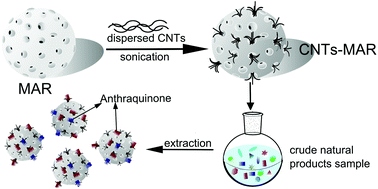Abstract: In this paper, we demonstrate a novel carbon nanotube (CNT) reinforced macroporous adsorption resin (MAR) for the first time. The CNTs were dispersed in water via sonication, and then in situ physically entrapped in the pores of MAR by capillary forces and sonication. The resulting CNT reinforced MAR (CNT-MAR) was proved by transmission electron microscopy (TEM) and confocal laser scanning microscopy (CLSM), and subsequently applied to extract a mixture of 8 types, 14 natural products. For comparison, the extraction efficiency of original MAR without CNTs was also evaluated. After extraction, the supernatants were detected via high-performance liquid chromatography (HPLC). The results indicated that the introduction of carbon nanotubes (CNTs) into the pores of MAR can significantly improve the adsorptive selectivity of MAR for natural products. The original MAR without CNTs has almost the same adsorption capacity for selectively extracting 3 types of natural products (phenols, alkaloids and anthraquinones). However, the CNT-MAR only could selectively extract anthraquinones and the adsorption capacity for three anthraquinone natural products is 1.46-1.83 times higher than that of unmodified MAR. In order to achieve the highest extraction efficiency of CNT-MAR for anthraquinone natural products, the main extraction parameters such as the extraction time and the pH value were also optimized. The CNT-MAR demonstrated an excellent ability to extract anthraquinone natural products with high selectivity and adsorption capacity. Due to its low cost, easy preparation and use, and operational characteristics, it shows great potential for selective extraction of natural products.

KeyWords Plus:SOLID-PHASE MICROEXTRACTION; ACID ASSOCIATED PROTEINS; HOLLOW-FIBER MEMBRANES; LIQUID-CHROMATOGRAPHY; AQUEOUS-SOLUTION; GAS-CHROMATOGRAPHY; WATER; SAMPLES; ELECTRODES; SEPARATION
Published in NANOSCALE, 7 (44):18619-18627; 10.1039/c5nr05454k 2015


